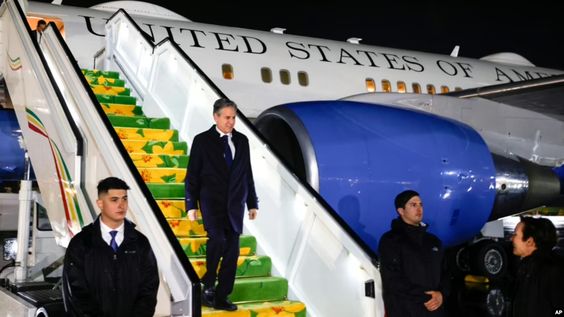Africa
Visits to Ethiopia and Niger by Blinken as US Strengthens Africa Drive

The Biden administration is stepping up its efforts to connect with Africa in order to offset China’s expanding influence on the continent, and Secretary of State Antony Blinken is now visiting Ethiopia and Niger, according to the State Department.
Blinken is in Addis Abeba and later this week will go to Niamey to talk about the peace agreement that put an end to fighting in Ethiopia’s northern Tigray area as well as broader counterterrorism initiatives aimed at Islamic extremists in Niger and the Sahel.
He will be making his fourth prominent trip to Africa this year, all by high-ranking officials from the Biden administration. First lady Jill Biden, Treasury Secretary Janet Yellen, and U.S. Ambassador Linda Thomas-Greenfield have previously travelled there.
Blinken will be the first secretary of state to ever visit Niger, which has hosted U.S. military operations aimed against Islamic State militants in the region. He wants to meet with both Ethiopian and Tigrayan authorities in Addis Abeba.
The State Department stated that Blinken will concentrate on “implementation of the cessation of hostilities agreement to advance peace and promote transitional justice in northern Ethiopia” in conversations with Ethiopian Prime Minister Abiy Ahmed and Tigrayan authorities.
The U.S. suspended certain preferential trade deals with Ethiopia as a result of the Tigray war, which the African nation is eager to have reinstated. But, the top US diplomat for Africa stated on Friday that Addis Ababa has to take greater initiative, particularly in the wake of the “earth-shattering” Tigray violence.
The assistant secretary of state for African affairs, Molly Phee, stated, “What we’re aiming to do is refashion our connection with Ethiopia. We would like to be able to establish a collaboration that is appropriate for their size and impact as well as for our interest in and dedication to Africa.
READ ALSO: Tinubu’s election, rejection of religious intolerance, and sectarian politics – President
But she added that in order to move the partnership ahead, Ethiopia must continue to take action to end the cycle of political and ethnic strife that has held the nation back for so long.
A year after Abiy won the Nobel Peace Prize for reaching a peace agreement with longstanding foe Eritrea, fighting broke out in Tigray. The Tigray regional leaders, who had long controlled Ethiopia’s government prior to Abiy taking office, were seen as a shared danger by both the Ethiopian and Eritrean governments.
Throughout the two-year struggle that came to an end with a peace accord signed in South Africa in November, an estimated 500,000 people were slaughtered. The settlement was brokered by US authorities.
More than 5 million people live in the Tigray area, which was shut off by the violence. Humanitarian aid is frequently obstructed and essential services are interrupted, and healthcare staff are pleading for the most basic medical supplies.
In a meeting with Moussa Faki Mahamat, the head of the African Union Commission based in Addis Abeba, Blinken will also attempt to thwart Chinese and Russian efforts to win support from African countries regarding Russia’s conflict with Ukraine, a subject that has caused significant concern among formerly colonised states.
